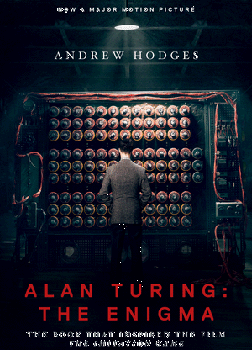Andrew Hodges Speaks on Alan Turing At Princeton Public Library Thursday


ALAN TURING: THE ENIGMA: The cover of the new American edition of “Alan Turing: The Enigma” by Andrew Hodges from Princeton University Press makes much of the connection to the new feature film, “The Imitation Game,” starring Benedict Cumberbatch and Keira Knightley. The book has been described as the definitive source on Alan Turing. Mr. Hodges will discuss his work on Thursday, December 4, at 7 p.m. in the Community Room at the Princeton Public Library. For more information, visit: www.turing.org.uk.
Oxford mathematician Andrew Hodges will discuss his classic 1983 biography of the mathematical genius and pioneering computer scientist Alan Turing (1912-1954) as part of the Thinking Allowed series co-sponsored by the Princeton Public Library and Princeton University Press in the Library’s Community Room this Thursday, December 4, at 7 p.m.
Currently on a U.S. book tour, Mr. Hodges is the authority on his subject. His 500-page biography, Alan Turing: The Enigma has been re-issued with a new preface and a foreword by Douglas Hofstadter, timed to coincide with the new British-American movie on Turing’s life that has just come out.
But don’t ask Mr. Hodges to comment on the movie. He’s in Princeton to talk about Alan Turing rather than Benedict Cumberbatch.
Nonetheless, the new film, which also stars Keira Knightley and Charles Dance, is causing quite a stir. Einstein biographer Walter Isaacson has interviewed the actors about their work. Titled The Imitation Game, the film combines elements of tortured genius, gender, and romance against the backdrop of World War II and the race to break the German Enigma code at Britain’s Bletchley Park.
Its unlikely hero is the British mathematician, codebreaker, and pioneering computer scientist Alan Turing, the man Winston Churchill said had made the single biggest contribution to Allied victory in the war against Nazi Germany. Given Mr. Turing’s accomplishments, one might wonder why he is not a household name.
Mr. Turing, who gained his PhD at Princeton University before the war, is considered the father of theoretical computer science for his model of a general purpose computer, known as the “Turing machine.” His ideas formed the basis for the pursuit of artificial intelligence (AI) which makes the film’s title especially apt, “imitation” being the key question in AI, as in “can a computer simulate human behavior?”
In addition to being a mathematical genius, Mr. Turing was also gay, at a time when homosexual acts were subject to criminal prosecution. In 1952, he was charged with “gross indecency.” Rather than go to prison, Mr. Turing agreed to be treated with estrogen injections, a chemical method of castration. He committed suicide two years later.
In 2013, Mr. Turing received a Royal Pardon for his 1952 conviction. According to Michael Saler, writing in The Times Literary Supplement, the pardon was largely the result of Mr. Hodges’s “superb biography.”
If the film sends people to Hodges’s richly detailed and carefully researched book they will discover “one of the best scientific biographies ever written.” Britain’s The Guardian newspaper has listed it as one of the essential 50 books of all time and John Nash biographer Sylvia Nasar, author of A Beautiful Mind, called it “one of the finest scientific biographies I’ve ever read: authoritative, superbly researched, deeply sympathetic, and beautifully told.”
Alan Turing: The Enigma has also been described as a “perfect match of biographer and subject.” Like Mr. Turing, Mr. Hodges is a mathematician; he is also gay. His book draws from primary sources and interviews with those who knew Turing. Hodges is able to explain Turing’s intellectual accomplishments in plain terms without recourse to heavy mathematical symbolism, explaining how Turing’s revolutionary idea of 1936 laid the foundation for the modern computer, realized in 1945 with his electronic design that helped to break the German Enigma ciphers. He also explores Turing’s sexual identity with understanding and compassion. In short, Hodges brings a mathematical genius to life, from his beginnings as a young man fascinated by science to his tragic end.
Besides the most recent movie, Alan Turing: the Enigma was the basis for the 1986 play Breaking the Code by Hugh Whitemore and starring Derek Jacobi, who reprised the role on British television in 1996.
Mr. Hodges’s book tour will include New York’s 92nd Street Y on Friday, December 5, before he travels to California and Washington. For more information, visit: www.turing.org.uk.

